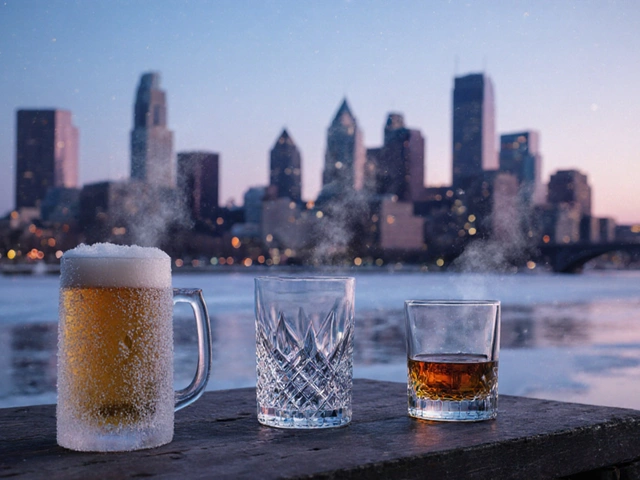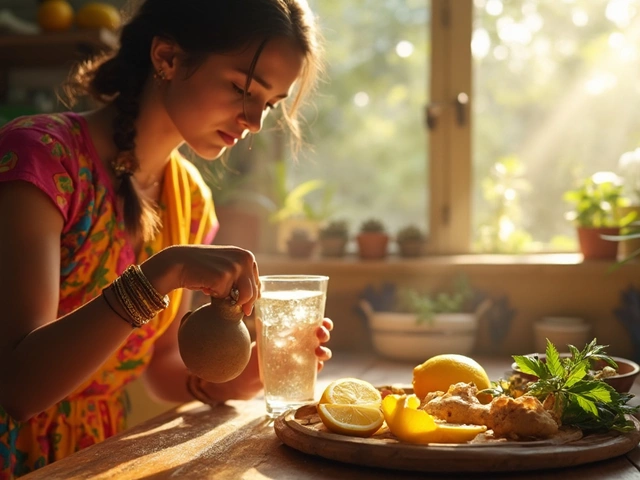
Ever woken up after a night of sampling whisky, rum, or gin and wondered why the headache feels different from a typical beer‑induced hangover? That question hits right at the heart of how Spirits is a distilled alcoholic beverage that usually contains a higher proof than wine or beer interact with your body. Below we break down the chemistry, the role of specific ingredients, and practical steps to keep the morning after from ruining the fun.
What a Hangover Really Is
A Hangover is the collection of physical and mental symptoms that appear after blood alcohol levels start to fall. Common signs include headache, nausea, fatigue, and sensitivity to light. While the feeling is universal, the exact cause is a mix of several physiological processes that vary with the type of alcohol you consume.
The Core Driver: Ethanol
All alcoholic drinks share Ethanol as the primary psychoactive ingredient. Your liver breaks down ethanol using the enzyme alcohol dehydrogenase, turning it into acetaldehyde, a toxic compound that contributes heavily to that pounding feeling. Acetaldehyde is then converted to acetate, which your body can finally dispose of. The speed and efficiency of this conversion differ from person to person and set the baseline for any hangover risk.
Why Spirits Can Feel Worse: Congeners
Distilled drinks contain more Congeners than most beers or wines. Congeners are by‑products of fermentation and distillation-things like methanol, tannins, and certain acids. Darker spirits (bourbon, brandy, rum) typically have higher congener levels than clearer ones (vodka, gin). Studies show that higher congener content correlates with more severe hangovers, even when the ethanol dose is identical.
Dehydration: The Silent Contributor
Alcohol is a diuretic, meaning it makes you pee more. Dehydration is the loss of water and electrolytes that leads to many hangover symptoms like thirst, dry mouth, and dizziness. Spirits usually have a higher proof, so you lose fluids faster per ounce than you would with a low‑ABV beer. The result is a faster drop in blood volume, which can make the headache and fatigue feel more pronounced.

Histamine and Sugar: Hidden Triggers
Many spirits, especially aged ones, contain histamine from the aging process. Some people lack the enzyme diamine oxidase needed to break down histamine, leading to flushing, runny nose, or sinus pressure after drinking. In addition, flavored spirits and liqueurs often pack extra sugar. Sugar spikes insulin, which can cause a crash later, amplifying the low‑energy feeling of a hangover.
Alcohol Metabolism Differences by Spirit Type
Here’s a quick rundown of how the body deals with common spirits:
- Whisky: High in congeners and often aged in charred barrels, which adds tannins and smoky compounds.
- Vodka: Usually filtered multiple times, resulting in fewer congeners but still a high ethanol concentration.
- Rum: Dark rum contains molasses‑derived sugars and many congeners; light rum is cleaner but still higher proof than beer.
- Tequila: Blanco tequila is less aged, so fewer congeners, while reposado and añejo develop more from wood.
- Gin: Botanical infusion adds antioxidants that may slightly mitigate inflammation, but the underlying ethanol still drives hangover risk.
Comparing Common Spirits by Congener Level and Hangover Risk
| Spirit | Typical ABV | Congener Level (mg/L) | Hangover Risk Rating* |
|---|---|---|---|
| Vodka (filtered) | 40% | Low (≈ 10) | Low |
| Gin | 40% | Low‑Medium (≈ 15) | Medium |
| Blanco Tequila | 40% | Medium (≈ 20) | Medium |
| Light Rum | 40% | Medium (≈ 25) | Medium‑High |
| Whisky (bourbon) | 45% | High (≈ 40) | High |
| Dark Rum | 40% | High (≈ 45) | High |
| Brandy | 40% | Very High (≈ 60) | Very High |
*Ratings are relative and based on peer‑reviewed studies that measured congener concentrations and self‑reported hangover severity.

Practical Tips to Dodge the Morning After
- Stay Hydrated: Drink a glass of water between each alcoholic sip. Aim for at least 500 ml of water for every 30 ml of spirit.
- Choose Lower‑Congener Options: Clear spirits like vodka or gin tend to cause milder hangovers than dark, aged liquors.
- Watch the Mixers: Sugary sodas and fruit juices add extra sugar, which can worsen the crash. Opt for club soda or a splash of citrus.
- Eat Beforehand: A protein‑rich snack slows ethanol absorption, reducing peak blood alcohol concentration (Blood Alcohol Concentration) and the subsequent hangover intensity.
- Limit Total Volume: Even low‑congener drinks can cause a hangover if you consume too much ethanol. Stick to a moderate total-about two standard drinks per hour.
- Take a B‑Complex Vitamin: B‑vitamins help the liver process alcohol more efficiently, though they are not a cure‑all.
- Consider Antihistamine‑Free Brands: Some gin and whisky producers test for lower histamine levels, which can help those sensitive to it.
Following these steps doesn’t guarantee a completely symptom‑free morning, but it dramatically lowers the odds that a night of spirit tasting will end in a pounding headache.
When to Seek Medical Help
If you experience persistent vomiting, confusion, a rapid heartbeat, or a fever after drinking, it could signal alcohol poisoning rather than a typical hangover. These conditions require immediate medical attention. Also, people with liver disease, diabetes, or certain medication interactions should consult a healthcare professional before indulging in high‑proof spirits.
Bottom Line: Do Spirits Give You Hangovers?
Yes-spirits can cause hangovers, and in many cases the after‑effects feel harsher than those from lower‑ABV drinks. The culprits are a combination of ethanol, higher congener levels, faster dehydration, and added sugars or histamines. Choosing clearer, low‑congener spirits, staying hydrated, and pacing yourself are the most effective ways to keep the night enjoyable and the morning manageable.
Why do some spirits cause worse hangovers than others?
The main reasons are congener content, proof level, and any added sugars or histamines. Dark, aged spirits usually have more congeners, which increase toxicity after the ethanol is metabolized.
Is vodka the safest spirit for a hangover‑free night?
Vodka tends to have the lowest congener levels, but it still contains ethanol. Drinking in moderation and staying hydrated are essential, even with vodka.
Can I drink water after each spirit to avoid a hangover?
Yes. A good rule of thumb is one 250‑ml glass of water for every 30‑ml shot of spirit. This helps offset the diuretic effect and keeps blood volume stable.
Do mixers affect hangover severity?
Sugary mixers add extra glucose, which can cause an insulin spike and later crash, making the hangover feel worse. Plain soda, tonic, or a splash of citrus are lighter choices.
Are there any foods that help prevent hangovers?
Protein‑rich foods, healthy fats, and complex carbs slow alcohol absorption and keep blood sugar steady. A bite of eggs, avocado toast, or a handful of nuts before drinking can make a difference.





Categories